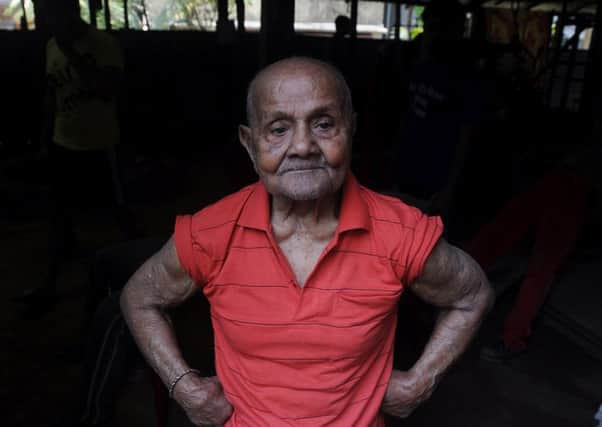Obituary: Manohar Aich, bodybuilder


Manohar Aich went from selling coconuts at a railway station to becoming India’s first Mr Universe, with the sobriquet “Pocket Hercules” despite only standing at 4ft 11ins.
At the peak of his bodybuilding powers, he weighed in at seven stone and his statistics were a perfect “V-shape” –biceps 46cm, chest 1.2m when swollen, forearms 36cm and wrists 16.5cm. He went on to win many awards, including three gold medals at the Asian Body Building Championships.
Advertisement
Hide AdAdvertisement
Hide AdContinuing to compete in bodybuilding competitions, he toured India in the 60s and 70s, and even learnt to ripple his stomach muscles to the rhythm of Bollywood songs.
As a national hero, he could have eased up, instead, the discipline continued unsparingly, working-out well into his 90s, with 90 minutes’ exercise each morning. Aich attributed his longevity, his strength and good health down to “a simple diet of milk, fruits and vegetables along with rice, lentils and fish”. He never drank or smoked. “I never allow any sort of tension to grip me,” he said. “I had to struggle to earn money since my young days, but whatever the situation I remained happy.”
Born in 1912 in the small village of Putia near Comilla, Bengal, during the days of the British Empire, now Bangladesh, Manohar Aich was the son of a poor peasant family. His father, Mahesh, and mother, Chapala, barely made enough to feed their large family and they lived on a diet of mangos, jackfruit and vegetables, which Aich said made him a “rather plump child”.
Growing up, he used to watch a group of wrestlers fighting in a ring and, at school in Dhaka, he began to lift weights. However, aged 12, he was struck down by Black Fever, the second-largest parasitic killer in the world after malaria. His parents were too poor to afford medicines, so instead he began an exercise regime, feebly copying the older boys with their dumb-bells and doing relentless reps of squats and push-ups; this became a lifelong conviction that simple exercise was the key to building strength and success in life.
Upon finishing school, with his father too ill to work, he got a job performing with a magician, PC Sorcar, in village shows with exotic titles such as “Physique and Magic”. His feats included bending metal bars with his neck, hands or teeth, dragging 200kg weights with his teeth, tearing 1,500-page books in half with his bare hands and reclining on the points of swords. The show travelled around India, making him famous.
In 1941, Aich joined the Indian Air Force, an arm of Britain’s Royal Air Force, as a physical training instructor. He was well-liked by the officers, but the Quit India Movement was already stirring in him, and when a British officer made some comment about Indians needing their colonial rulers, he slapped him. A resulting court martial found him guilty of insubordination and sentenced him to five years.
He recalled, “It was a blessing in disguise.” Encouraged by English officer Reub Martin, Aich took-up bodybuilding, using the available weights and training up to 12-hours a day, while also receiving a special diet. With Indian independence in 1947, the family was forced to leave their home after it had become part of East Pakistan.
Aich was subsequently released but the man who emerged from the Alipore Presidency Prison was no starveling, but glistened and bulged with perfect tone. With little money to raise his family of four children, he took on numerous jobs, including peddling coconuts outside a Calcutta railway station and working as a clerk.
Advertisement
Hide AdAdvertisement
Hide AdIn 1950, aged 38, his new physique enabled him to win the Mr Hercules contest, earning him the moniker “Pocket Hercules”. The following year, he started to do private bodybuilding shows to raise funds for his passage to London to compete in Mr Universe – an amateur competition, which had begun in 1948 to coincide with the London Olympic Games.
With barely enough to reach the competition, Aich arrived and finished second. Determined, however, to succeed, he remained in London and got a job as a guard with British Rail. In between shifts, he worked out remorselessly.
In 1952, in the Pro-Short division of the NABBA, he won Mr Universe and to his delight, upon securing the title, BR paid for his ticket home. He returned a hero though never cashed in on his celebrity status, preferring, instead, to concentrate on his bodybuilding and winning more titles. He became an inspiration to tens of thousands.
The rooms of his house were adorned with posters and pictures of his youthful oil-rubbed torso. He kept a strict timetable, rising at 4am with songs or chants to the shoulder drum, reading the newspaper each evening, and remaining “a cool customer,” according to his grandchildren.
In later life, he still proudly displayed a rippling abdomen and was a regular gym-goer in Calcutta, where he mentored younger bodybuilders and future champions. He also helped his two sons, one of whom runs a boarding house for martial artists, while the other runs a fitness centre.
In 1991, he flirted with politics, standing in a local election for the Hindu Nationalist BJP Party and finishing third. In 2015, he was given the Banga Bibhushan Award for his services by the West Bengal Government.
Aged 99, he suffered a stroke, which, he lamented, “restricted his movement” and prevented his life-long visits to the gym.
Aich married Jyotika in the 1950s and always maintained that her silent contributions behind the scenes had been immense.
She died in 2001 after which “life became a burden,” he said. He is survived by their two sons and two daughters.